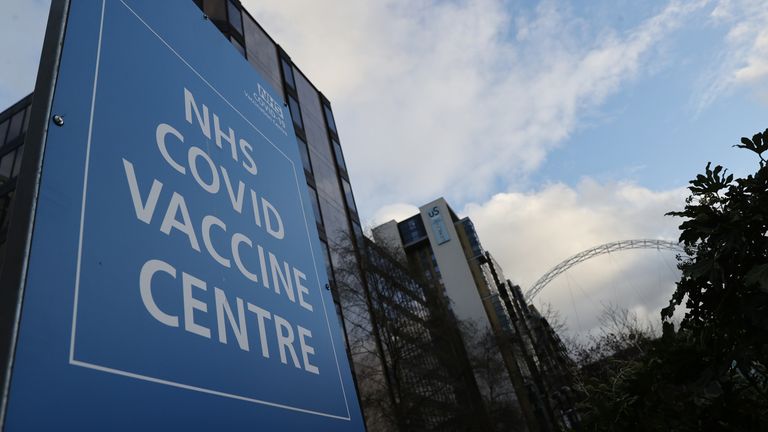The UK has planned to ensure second COVID jabs are administered on time, according to the culture minister, who also confirmed a batch of the Moderna vaccine was due to arrive in the coming weeks.
It comes as England is set to relax lockdown restrictions with the rule of six returning from Monday, and the government considering a traffic light system to allow shorter quarantine periods amid “challenges” over international travel.
Appearing on Sophy Ridge On Sunday, Oliver Dowden was asked if he can guarantee everyone will receive their second jab on time.
“Yes, of course, we’ve been planning that all the way through,” he said.
“It’s one of the most important considerations as we’ve rolled out the vaccine.
“In all of our planning, we have factored in getting that second dose of the vaccine.”
Mr Dowden also confirmed a batch of the Moderna vaccine will arrive in the UK “later this month” – but later said he meant April.
Scotland and Wales have already relaxed some lockdown restrictions, and England will follow suit on Monday, with groups of up to six, or two households, being able to socialise in parks and gardens once more.
Outdoor sports facilities are also set to reopen, with the country’s stay-at-home order due to end.
Prime Minister Boris Johnson has said he is wary of the prospect of rising coronavirus infection rates, but sees “absolutely nothing in the data” to halt the easing of the lockdown.
However, NHS England national medical director, Professor Stephen Powis, said COVID-19 still had the capacity to “wreak more havoc and ill health on a significant scale”.
Following a successful start to the vaccination campaign, Prof Powis said the prospects “look immeasurably brighter and more positive” but that “does not mean job done”.
“We’ve made enormous progress that we need to build on and not squander the gains we’ve made,” he wrote in The Sunday Telegraph.
Mr Dowden reiterated this message, adding: “I think tomorrow is an important day.
“First of all, allowing grassroots sports to resume, which is so important for our nation’s physical and mental health, but also ensuring that people can once again meet their loved ones outside.
“Of course, it’s important that we continue to abide by the rules but this is an important step back towards normality.”
On reports that millions of vaccine doses were to be offered to Ireland, Mr Dowden said the UK does not “currently have a surplus” of coronavirus vaccines.
“Clearly, our first priority is ensuring we deliver vaccines in the United Kingdom,” he said.
“We clearly don’t currently have a surplus of vaccines, should we get to the point where we have a surplus of vaccines we’d make decisions on the allocation of that surplus.”
On negotiations with the EU about supply, he said: “We continue to have constructive discussions with the EU.
“Our position is very clear, that the EU should not be engaging in blocking exports and that they should honour the pledge that Ursula Von De Leyen gave to Prime Minister Boris Johnson a short while ago.”
Mr Dowden said it was agreed that “any contracts should be honoured, so that is to say that if vaccines have been provided in honouring of the contracts, that should be honoured by the EU and we expect them to abide by that”.
The arrival of the Moderna vaccine could see the rollout extended to the next age group, according to Professor Anthony Harnden, deputy chair of the Joint Committee on Vaccination and Immunisation (JCVI).
Speaking to BBC Breakfast on Sunday, he said: “We examined the data from Moderna, which looks very promising.
“If we’ve caught up with all those over-50s we want to reach out to, it makes sense to go toward our next age group, which is the 40 to 49-year-old age group.”
With summer just around the corner, the issue of international travel is also being considered and the culture secretary admitted there are “challenges” due to rising infection rates in Europe.
Asked about a proposal of a traffic light system that could allow shorter quarantine periods with greater testing, he told Sophy Ridge: “We’re exploring all these issues as part of the international travel taskforce.”
He also said a further £500m of funding for cultural organisations will be announced this week.
“The first allocation was £1.5 billion so that’s for this financial year.
“We have already announced £1bn worth of that, helping over 4,000 organisations up and down the country.
Subscribe to the Daily podcast on Apple Podcasts, Google Podcasts, Spotify, Spreaker
“At the end of this week we will announce the remaining allocations to take us up to the £1.5bn.”
Meanwhile, the first minister of Wales said he could not give assurances that the current lockdown in the country will be its last.
When asked whether this was the last lockdown, Mark Drakeford told Andrew Marr on the BBC: “I’m afraid I don’t think anybody responsible in my position will be able to do that any time soon.
“We see what’s happening in the continent of Europe, we know about the new variants that are being discovered around the globe.
“Work still needs to be done in making sure that coronavirus is genuinely in the rear view mirror.”






